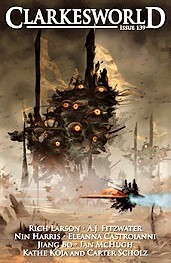“Carouseling” by Rich Larson
Reviewed by Stephanie Wexler
In Rich Larson’s “Carouseling,” Ostap (an art designer for a kid’s show) is in a long distance relationship with Alyce (a scientist) who is testing the boundaries of quantum mechanics in Mombasa. On the eve of an experiment that will change their world, Ostap and Alyce share a tender last dance using “linkwear” before signing off. Alyce’s fate is predictable. However, witnessing Ostap’s grief and then accidental discovery creates the daring loophole Alyce’s scientists may need. Ostap’s hopes, dreams and finally the cold truth make the ending even harder to read. Larson really wants Ostap to save the scientists, but in the end science doesn’t have all the answers. Yet, in an odd twist, Ostap gets one last moment to say goodbye.
Nell, in “Without Exile” by Eleanna Castroianni, is a corporate lawyer at a space station that acts as a processing facility for refugees. Due to Nell’s unique heritage, the task of working with a Koohar woman and her child falls in her lap. Supposedly, Koohar can be a chore to handle. As Nell interviews and preps Uruna for their bid for asylum, a picture of the Koolar people develops. Nell’s own dim past, after her own time as a child in this station, starts to resurface. It soon becomes hauntingly apparent that Nell’s life has gaps after losing her parents and homeland. Castroianni expertly fleshes out the lives of two very different people of the same race creating a dynamic vision of a very misunderstood culture.
In “Violets on the Tongue” by Nin Harris, we follow Eshe and a spare few others who are exploring their pseudo-world called Sesen created to mimic Earth. What little detail of Earth’s last days and their escape made via a tunnel-through becomes less important as the humans learn about their environment around them. It is made clear that this world is an experiment driven by the oversoul. Nothing is what it seems as people grasp how to change their form and forge strange attachments to beasts and the inanimate objects as their whims change. Harris’s philosophical rendering of what it is like to live on an almost Earth-like habitat is enthralling as each character embraces or mentally strives to deal with the new reality.
Enfys lives in a post-apocalyptic world where “the phage” has wiped out large portions of humanity across the world in “Logistics” by A.J. Fitzwater. Times are tough for Enfys; dwindling resources, illness, and constant fear that she will never find tampons are her main concerns. Yes, that’s right, tampons! She isn’t embarrassed, either. Instead, she explains that the production of goods, especially sanitary napkins, are critical to the world’s redevelopment. Even though Enfys is traveling mostly alone, she is broadcasting via an App (the internet is still running). Her blog by blog entries document her travels, observations and encounters with people. Fitzwater presents a hilarious and poignant look at what one person’s can-do attitude can do to rebuild the world. One tampon at a time!
Xiaoyu and Max are astronauts in “The Wings of Earth” by Jiang Bo (translated by Andy Dudak). Whatever their mission is in space soon becomes overshadowed by the flyby of a mysterious alien object. Quickly, both men are ordered to return to Heavenly Palace Seven space station while various organizations and political groups scramble for answers about the UFO. Events get more complicated when communication devices fail and the aliens make their first move. It is unknown why Xiaoyu was chosen to greet the aliens. Yet, obviously there is a race to be the first to greet the visitors. Regardless, Jian Bo’s aliens are grandiose and have great intentions for humanity, yet with so little development surrounding the central characters, the aliens’ purpose packs little punch.
 Clarkesworld #139, April 2018
Clarkesworld #139, April 2018